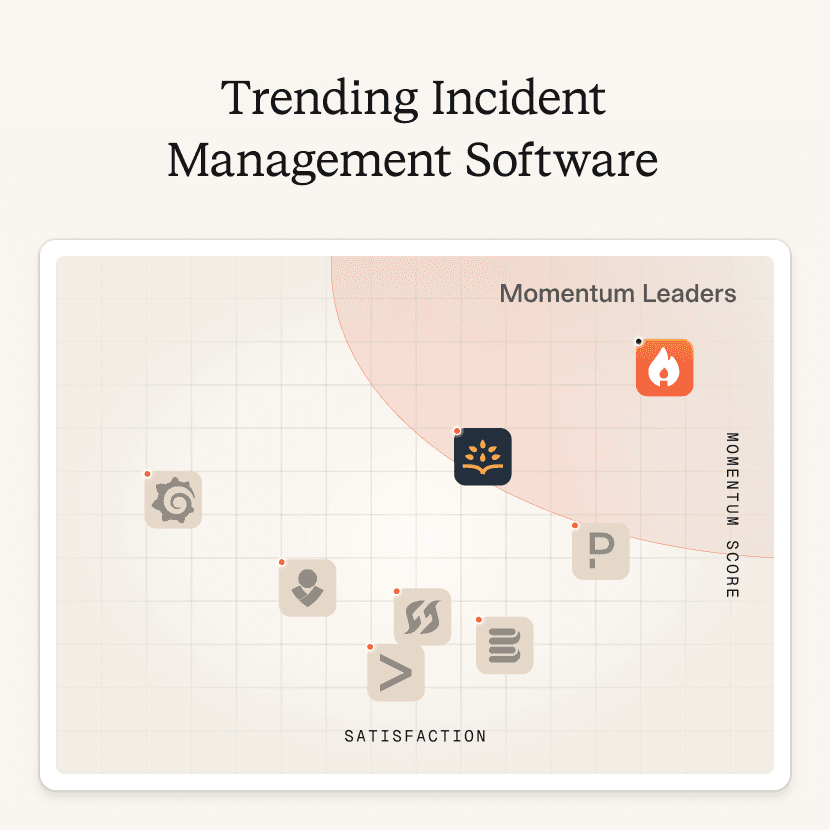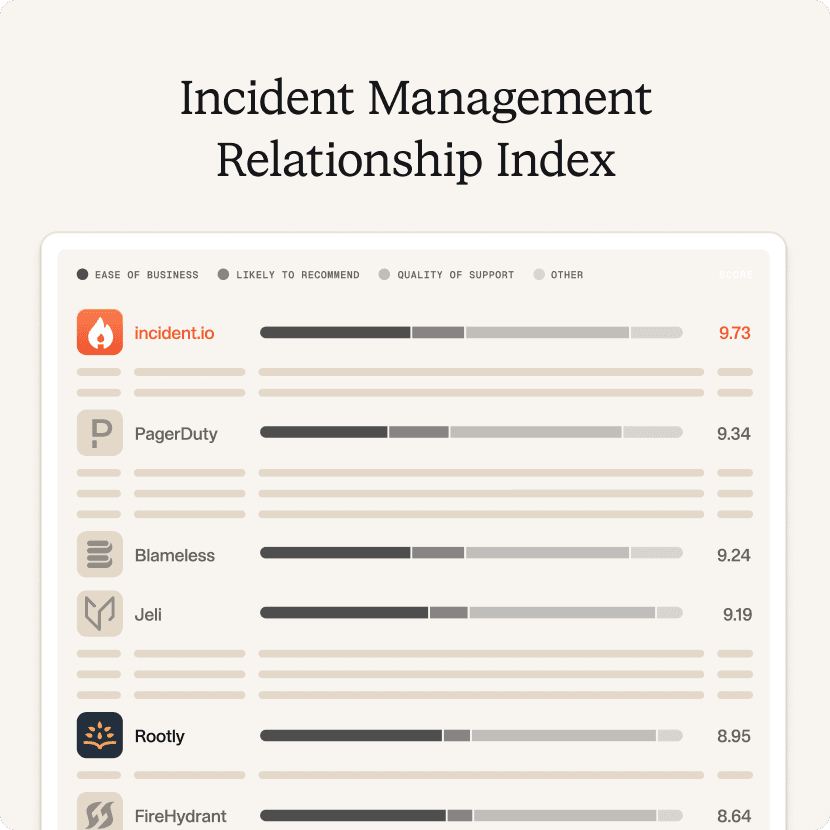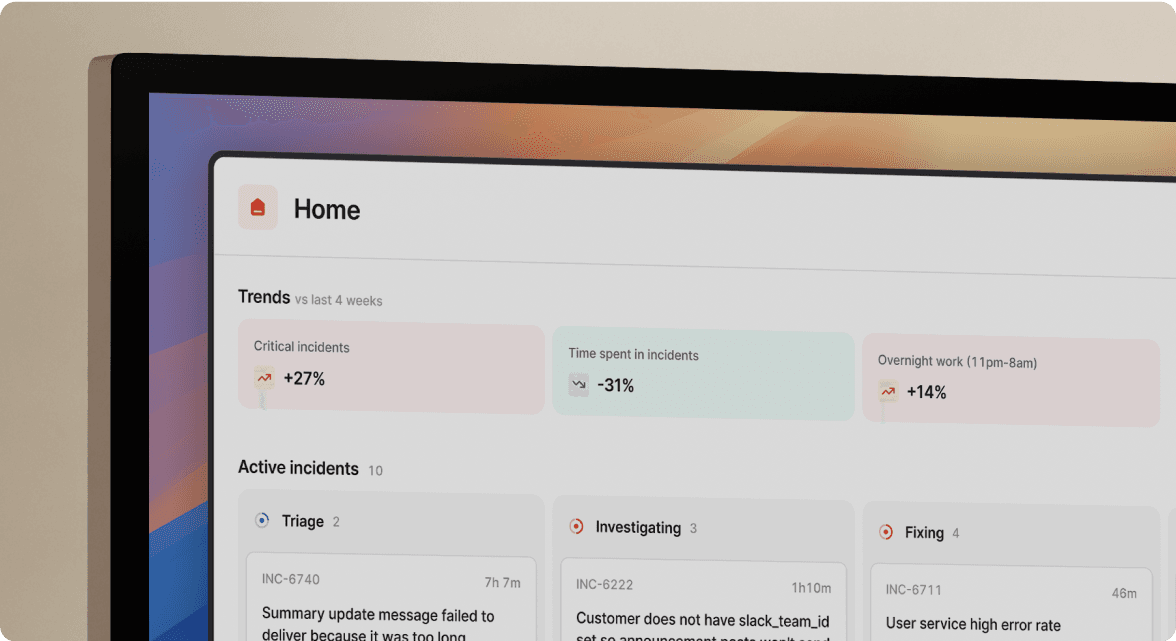incident.io vs Rootly
Similar on the surface, but put them to the test and the differences are clear. incident.io is built for the whole organization and is widely deployed in some the world’s most recognizable organizations.
incident.io and Rootly might appear like similar tools, but peek beneath the surface and you’ll find they’re really quite different. From the underlying philosophy of the companies, to the implementations of the products, and on to the customers using each tool, there’s plenty that’s different.
We’ve outlined some areas you might want to consider, but we’d encourage you to put both tools and companies to the test. We’re confident you’ll end up making the right decision.
If you're in a rush, here's the tl;dr
Rootly and incident.io aren’t so different on the surface. Stack up the two products on a feature matrix and you’ll likely see lots of ticks on both sides.
Where you’ll see the difference is in the depth of product (we go deeper), how well suited they are to true enterprise deployments (of which we have many), and the level of service we offer (ours is really good).
If you’re still unsure, give them a try. We’re very confident you’ll come to the same conclusion as HashiCorp, Miro, and the many other organizations that chose incident.io after evaluating both tools.
Sounds interesting but I have a few questions…
Are you headed in the same direction?
No. Rootly is an engineering tool for engineers. At incident.io, we’re building a product to help your entire organization respond to incidents, and learn from failures more effectively.
This philosophy comes from the experience of our founding team, and flows through everything we do. Whether it’s the integrations we build, or our delightful user experience—we’re building a product designed for your entire organization to love.
Are there any specific feature differences you could highlight?
There are, but we’d encourage you to look at how the comparable features are built, how well and how easily they can fit to your use-case, and whether they can be adopted by everyone who needs to use them.
As for specifics, take a look at Catalog. It’s a core component of the incident.io platform and embodies our approach to whole-organization incident response. Bring your teams and users from an IDP, connect your CRM to bring context on customers, and connect with existing tooling like issue trackers and code repositories to level up your incident response processes.
Rootly lacks a dedicated catalog, relying instead on integrations with existing catalogs like Backstage. While this allows for automatic association of incidents with defined services, it means users cannot connect elements outside of their service catalog or incorporate additional relevant information within Rootly.
You mention support as a differentiator. What does that look like in practice?
At incident.io, we care as much about your experience after purchase as we do to supporting you during your trial.
We care about partnerships over transactions, and on top of dedicated Customer Success support, we routinely have our engineers, product managers and founders working with customers.
Being honest, are there areas where Rootly are better than you?
Yes! If you care deeply interacting with configuration at the level of JSON, you’ll find more for you in the Rootly tool. We believe in user experience over infinite configurability, which naturally leads to trade-offs.
There are a few corner cases where Rootly might be more flexible to your needs. We challenge you to find anything material here!
incident.io is trusted by the best...

Why organizations choose incident.io over Rootly
Used (and loved) by the whole organization
incident.io is not an engineering tool. We know incidents frequently start in more technical areas of an organization, but we equally know that it takes more than engineers to identify, respond to and properly learn from incidents.
Here’s a few things our customers highlighted that made the difference when choosing between tools:
- Customer support folks love the ease of use of incident.io for reporting incidents and streamlining communications with customers. Our Status Page is commonly owned by these people, and it’s intuitive and easy to use.
- Sales and Customer Success teams love that our CRM integrations help plug them into issues affecting their accounts. Engineers love having this customer information available at their fingertips while responding.
- Executives get the signal they need, without the noise. Whether it’s live incident communications, insights or confidence that folks are following their processes, incident.io customers highlight this as a differentiator.
Ease and speed of adoption
Whilst trialing incident.io alongside Rootly, our customers have remarked at the ease and speed of adoption of incident.io. We focus on the user experience for all involved, which drives a natural adoption loop. As one of our customers remarked: “Teams who’d never been trained or asked to use incident.io, found it during our trial period, and they ran some of the most effective incidents we’ve seen”
On first install of incident.io, you’ll get our opinions and sensible defaults configured so you can run great incidents within minutes. And when you’re ready to implement more bespoke configuration, the power is there to customize it exactly to your needs.
Routinely first to market
We’re first to market on features, and are driving the advances in the space.
And best of all, you don’t have to take our word for it. We publish our changelog of product updates and feature improvements every single week without fail. It’s clear who’s putting in the work and leading the charge here.
Or as one our customers said after choosing us: “I’d pick Rootly if I wanted the features of incident.io, but a month later”. We’ll leave you to draw your own conclusions, but there’s a reason why many of the Rootly features feel similar to incident.io.
G2 Reviews - incident.io vs Rootly
Take a look at G2 and you'll see incident.io is outpacing Rootly in both the momentum grid, highlighting high-trajectory companies, and a relationship index which factors in the ease of doing business, quality of support, and likelihood to recommend.
Read more about the Momentum Grid and Relationship Index.







So good, you’ll break things on purpose
Ready for modern incident management? Book a call with one of our experts today.

We’d love to talk to you about
- All-in-one incident management
- Our unmatched speed of deployment
- Why we’re loved by users and easily adopted
- How we work for the whole organization



